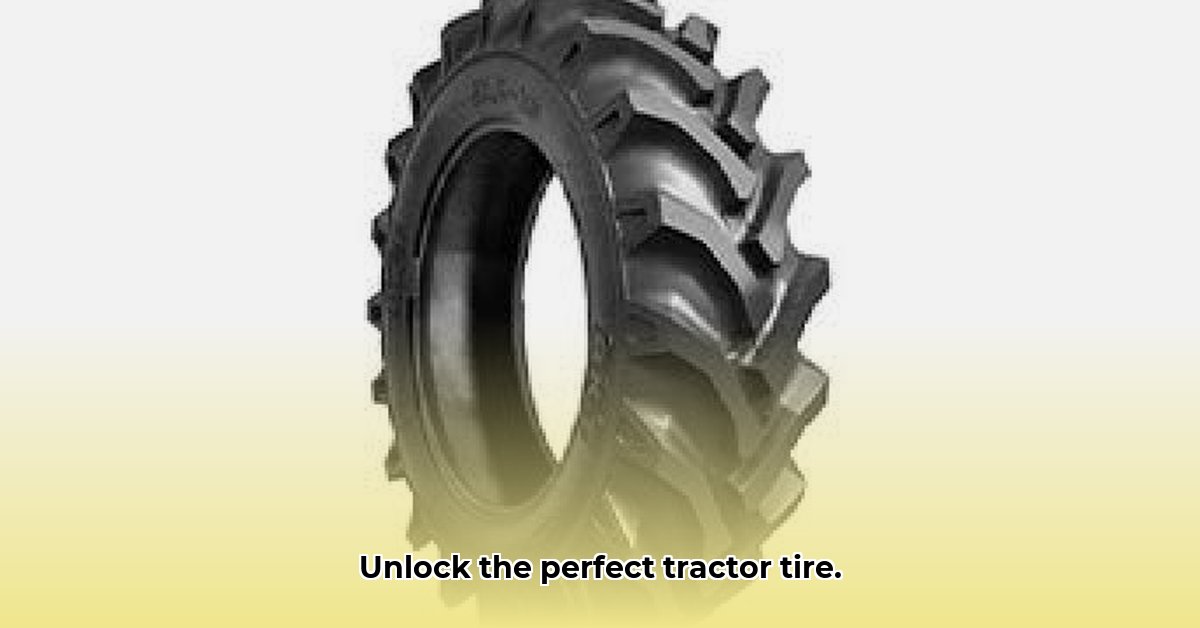
Finding the right 13.6-28 tractor tires is crucial for farm efficiency and profitability. This comprehensive guide will help farmers, retailers, and manufacturers navigate the market, select the ideal tires, and optimize their lifespan. We'll cover everything from understanding market trends to implementing effective maintenance strategies. For more on other tractor tire sizes, check out this helpful resource on 8-24 tractor tires.
Decoding the 13.6-28 Tractor Tire Market
The 13.6-28 tire size enjoys significant market demand, evidenced by its widespread availability from numerous suppliers. While precise market figures remain elusive without detailed sales data, the popularity likely stems from its compatibility with many common tractor models and suitability for various farming operations. This makes understanding market dynamics – including pricing trends and the availability of different tire technologies – vital for all stakeholders. Isn't it surprising how much rides on a seemingly simple tire size?
Choosing Your 13.6-28 Tractor Tires: Key Considerations
Selecting the right 13.6-28 tire involves more than just the size designation. Several factors will impact performance and longevity:
Load Capacity: This refers to the maximum weight a tire can safely carry. Underestimating this can lead to premature wear and potential failure. Overestimating it leads to unnecessary expense. Accurately assess the weight your tractor and implements will place on each tire.
Traction: The tread pattern significantly impacts traction. Deep, aggressive lugs provide superior grip in muddy conditions, while shallower treads are better suited for paved surfaces or dry, hard soil. What terrain will your tires most often encounter?
Tire Construction (Radial vs. Bias-Ply): Radial tires generally offer better fuel efficiency and a smoother ride, while bias-ply tires are often more durable and better suited for rough terrain. The choice here depends on the balance between fuel economy and durability required for your operation.
Cost vs. Long-Term Value: While initial investment is important, consider the tire's lifespan and fuel efficiency. A higher upfront cost might translate to significant savings over time. A cheaper tire might require more frequent replacements, negating any initial cost savings.
A Step-by-Step Guide to Selecting Your Perfect Tires
Assess Your Farming Operations: Analyze your typical workload: Are you hauling heavy loads? What soil types do you work on? What is the predominant climate? This analysis forms the cornerstone of your tire selection.
Consult Your Tractor Manual: Your tractor's manual provides specifications for tire size, load capacity, and pressure recommendations. Adhering to these recommendations ensures safe operation and optimal tire performance.
Analyze Tire Specifications: Carefully examine the load index (maximum weight capacity), speed rating (safe operating speed), and tread pattern. Match these specifications to your operational requirements.
Balance Budget and Performance: It is often better to invest in higher-quality tires which offer enhanced durability and fuel efficiency, leading to long-term cost savings despite a higher initial purchase price.
Compare Suppliers and Pricing: Investigate multiple suppliers to compare prices and specifications. Don't solely focus on the initial cost; factor in the total cost of ownership over the lifespan of the tire.
Maintaining Your 13.6-28 Tires: Essential Maintenance Tips
Regular maintenance significantly extends tire life and performance:
Tire Pressure: Maintain the recommended tire pressure as specified in the manufacturer's guidelines. Incorrect pressure leads to uneven wear and reduced efficiency.
Visual Inspections: Frequently inspect your tires for cuts, punctures, bulges, or excessive wear. Early detection of issues prevents larger, more costly repairs.
Tire Rotation: Periodically rotate your tires to ensure even wear distribution across all tires. Refer to your tractor's manual for the recommended rotation schedule.
Proper Storage: When tires are not in use, store them in a cool, dry place, away from direct sunlight and extreme temperatures.
Future Trends in 13.6-28 Tractor Tires
The agricultural tire industry is constantly evolving. Here are some noteworthy trends:
Sustainable Materials: Manufacturers are increasingly focusing on incorporating recycled and sustainable materials in tire construction.
Enhanced Fuel Efficiency: Research and development continuously aim to improve fuel efficiency through innovative designs and materials.
Smart Tire Technology: The potential for incorporating sensors and monitoring systems into tires allows for real-time data on pressure, temperature, and wear, leading to more proactive tire maintenance.
Conclusion: Informed Choices for a Thriving Farm
Choosing the right 13.6-28 tractor tires is a critical investment for efficient and profitable farming. By carefully considering the factors outlined in this guide and implementing proper maintenance strategies, farmers can optimize their tire performance, minimize costs, and maximize yields. Remember, prioritizing quality and understanding your specific needs are key to making the best decision for your farm.